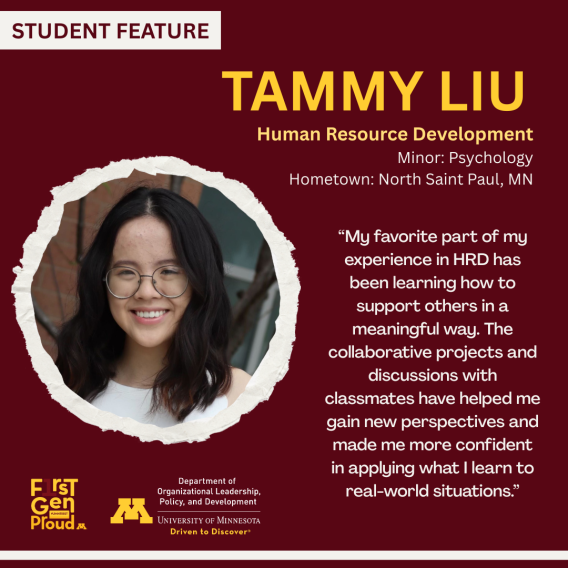OLPD Student Feature
Tammy Liu, Human Resource Development

- Major: Human Resource Development
- Minor: Psychology
- Hometown: North Saint Paul, MN
- First-Generation College Student
Why did you decide to pursue the Human Resource Development major?
I chose to pursue Human Resource Development (HRD) because I’m passionate about helping individuals reach their full potential while supporting organizational success. What draws me to HRD is its focus on creating environments where people feel valued, motivated, and supported in their growth.
While studying abroad in Denmark, I was introduced to the concept of “meaningful work” by Gitte Vonsild, which really resonated with me. Meaningful work is when individuals feel purpose, fulfillment, and a connection to something greater in what they do. It made me realize that I want to build a career where I can foster purpose-driven workplaces that align employee development with business goals. HRD combines my interests in human interaction and business strategy, and gives me the tools to make an impact on both individuals and organizations.
What has been your favorite part of your experience in your major?
My favorite part of my experience in the Human Resource Development major has been learning how to support others in a meaningful way. I enjoy the coursework with practical applications, especially when it comes to understanding workplace dynamics, leadership development, and training design. The collaborative projects and discussions with classmates have helped me gain new perspectives and made me more confident in applying what I learn to real-world situations.
What is one aspect of your major that has surprised you?
One aspect in my major that has surprised me is how applicable it is to everything. I learned a theory called “Lewin’s Change Management Model” in my Introduction to Human Resource Development class taught by Mutlaq Alqahtani and it made me realize how change isn’t just something that happens in organizations but it is something we experience in everyday life. Lewin’s Change Management Model explains change in three stages: unfreezing current behaviors, making the change, and refreezing to solidify new practices. The model’s three stages, unfreeze, change, and refreeze, helped me understand how people adapt to new situations, both personally and professionally. It showed me that the concepts we learn in HRD can be applied far beyond the workplace, helping us navigate change and support others through it in any setting.
What do you wish you would have known about careers in your major before now?
I wish I had known just how broad and flexible the career paths are with a degree in HRD. It’s not limited to human resources but there are opportunities in organizational development, consulting, learning and development, training design, and even business strategy. Knowing this would have helped me explore more opportunities and expand my knowledge in my career.
What minors, internships, or activities are you pursuing outside of your major? How do you think these opportunities shape your experience and/or future career plans?
Outside of my major, I’m pursuing Psychology as my minor, and I’ve been involved in TNTLab (Testing New Technologies in Learning, Assessment, and Behavior), which is a research lab focused on social and cognitive development. These experiences have helped me apply what I’m learning in HRD to real-life situations and have shaped my career interests. For example, working in TNTLab has deepened my understanding of how people think, learn, and behave in different environments, insights that are incredibly valuable when designing effective training programs or fostering positive workplace cultures. Combining psychology with HRD has strengthened my interest in employee development and helped me see how data and research can drive better organizational practices.
What advice do you have for future OLPD students?
My advice for future OLPD students is to take advantage of what the program offers. There are so many great resources, like internship postings, career events, and super helpful advising so try to explore those early on, even if you’re still figuring out your path. Don’t hesitate to talk to your professors, advisors, or staff either, they genuinely want to help and are great to go to for advice or support. Also, try to get involved outside of class through things like clubs, research, or internships. Those experiences can really help you discover what you enjoy and make the most out of your time in the program.